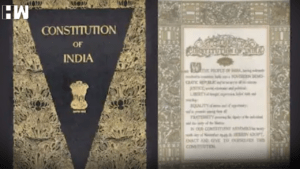Constitution Day: Rights Of Marginalized

“The prolonged struggle for independence culminated with the demise of the colonial reign, and the birth of an independent nation governed by self-rule,” the Chief Justice of India said New Delhi: As the country celebrates the 73rd Constitution Day, the Supreme Court has over the decades played a pivotal role…
The post appeared first on .


“The prolonged struggle for independence culminated with the demise of the colonial reign, and the birth of an independent nation governed by self-rule,” the Chief Justice of India said
New Delhi: As the country celebrates the 73rd Constitution Day, the Supreme Court has over the decades played a pivotal role in rendering landmark judgments many of which championed the rights of the marginalized. Speaking at the Constitution Day event in New Delhi, Chief Justice of India DY Chandrachud Saturday said India’s liberation from colonial rule and the drafting of the Constitution were simultaneous projects. “The prolonged struggle for independence culminated with the demise of the colonial reign, and the birth of an independent nation governed by self-rule,” the Chief Justice of India said.
“Our Constitution is a social contract entered into between those who are in power, historically and those who are oppressed and sought to change the power hegemony and choose to govern themselves,” CJI Chandrachud said.
is also known as ‘Samvidhan Divas’, is celebrated on November 26 every year to commemorate the adoption of the Constitution of India on November 26, 1949. A unique feature of the Indian Constitution, the cornerstone of India’s democracy, is that every law made by the parliament can be subjected to interpretation by the Supreme Court.
Here are some of the landmark judgments where the Supreme Court’s ruling changed the life of ordinary people for the better.
Kesvanand Bharti case: No judgment has been more instrumental in preserving the integrity of the Indian Constitution than the famous Kesvanand Bharti case of 1973. A 13-judge bench of the Supreme Court, then, ruled that the Parliament can make any amendment to the Constitution but it cannot amend or alter the ‘basic structure of the Constitution.
While the Supreme Court did not define what constituted ‘basic structure’, then Chief Justice SM Sikri said it may consist of the following features: (1) Supremacy of the Constitution; (2) Republican and Democratic form of Government; (3) Secular character of the Constitution; (4) Separation of powers between the Legislature, the executive and the judiciary; (5) Federal character of the Constitution.
Shah Bano Begum case: A legal milestone in the fight for the protection of the rights of Muslim women in India, the Supreme Court in its 1985 judgment upheld the right to alimony for a divorced Muslim woman. The top court also ruled that the Code of Criminal Procedure (CrPC) is applicable to all citizens irrespective of their religion.
Indra Sawhney case: While examining the scope and extent to which reservation can be provided to backward classes in jobs, the Supreme Court in its 1992 judgment upheld separate reservation for OBC in central government jobs, but excluded the “creamy layer” from the reservation. The top court also made it clear that the reservation must not breach the 50 per cent ceiling.
Vishakha Case: A landmark verdict that deals with sexual harassment of women at the workplace, the Supreme Court in 1997 laid down guidelines to be followed by organizations in dealing with complaints about sexual harassment.
The Supreme Court made it mandatory for all employers or persons in charge of work place whether in the public or private sector to take appropriate steps to prevent sexual harassment. It said that an appropriate complaint mechanism must be created in all organizations for the redress of the complaint made by the victim.
Also, Read: 72-Hour Ultimatum Issues By Punjab Police, For The Removal Of Social Media Content Glorifying Weapons
National Legal Services Authority case: In a landmark judgment, the Supreme Court in 2014 created the “third gender” status for transgenders. Earlier, transgenders could write either male or female against their gender.
“It is the right of every human being to choose their gender,” the top court had said while granting rights to those who identify themselves as neither male nor female. The top court also asked the Centre to treat transgender as socially and economically backward.
Triple Talaq case: In this 2017 ruling, the Supreme Court declared the Islamic practice of triple talaq unconstitutional. In a 3-2 majority verdict, the top court made unconstitutional the age-old practice under which a Muslim man could divorce his wife by uttering the word “talaq” thrice.
Right To Privacy case: The Supreme Court, through a nine-judge bench, in 2017 ruled that citizens have a fundamental right to privacy, that it is intrinsic to life and liberty and thus comes under Article 21 of the Indian constitution. The judgment declared privacy to be a fundamental right.
Navtej Singh Johar case: In its historic judgment, the Supreme Court in 2018 ruled that consensual adult gay sex is not a crime. Noting that sexual orientation is natural and people have no control over it, the top court struck down the British-era Section 377 of the Indian Penal Code (IPC), which deemed that gay sex is a punishable offense.
(Except for the headline, this story has not been edited by HW News staff and is published from a syndicated feed.)
The post Constitution Day: Rights Of Marginalized appeared first on HW News English.


